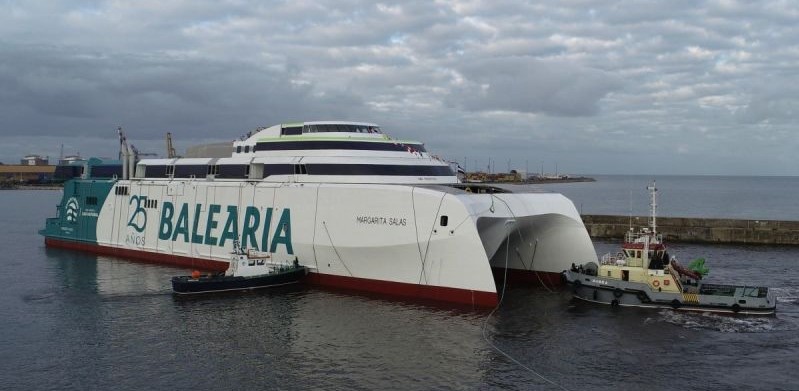Balearia launches its second gas-powered 'fast ferry'

Baleària launches its second gas-powered 'fast ferry', with more powerful engines and greater space in the lounges
- The shipping company has invested 126 million euros in the construction of the 'Margarita Salas', which will begin operating next summer
- The new catamaran joins the company's fleet of eleven vessels equipped with dual gas engines
In December 2023, Baleària launched the Margarita Salas fast ferry at the Armon Shipyard in Gijón, where it is being built. This is the shipping company's second fast ferry equipped with dual gas engines, which combines the most competitive features of the Eleanor Roosevelt catamaran, a pioneer in innovation and sustainability, with a series of innovations in design and engineering to elevate the customer experience. Thus, the ship's power has been increased by 10% and a second passenger deck has been added, which will allow greater space for passengers. Baleària has invested 126 million euros in the construction of the Margarita Salas, which will begin operating next summer.
The president of Baleària, Adolfo Utor, has highlighted that this second unit improves technologically and in comfort on the pioneer Eleanor Roosevelt. "We already had an excellent ship in terms of navigability, comfort and passenger satisfaction, and we cannot be more than proud to have taken another step with the Margarita Salas, which will surely obtain even better results." Utor has also highlighted the figure of the scientist Margarita Salas, after whom the ship is named: «We are adding another ship to our fleet that pays tribute to a pioneering woman in science, in this case an exceptional person and a reference figure, who focused her research in molecular biology.
In terms of sustainability, the president of Baleària has pointed out that the new catamaran is the eleventh in a fleet of ships equipped with the company's dual gas engines: "These ships, which currently sail using natural gas, will in the future be able to consume energy neutral renewables in C02 emissions. “The investment of more than €500 million in this fleet allows us to use the fuel available today, which reduces further emissions and positions us for decarbonization in the future.” Thus, the sister ship of the Margarita Salas, the fast ferry Eleanor Roosevelt, has stopped emitting more than 11,000 tons of CO2 this year thanks to using natural gas as fuel.
For his part, Laudelino Alperi, co-president of the Astilleros Armon group, has emphasized the "significant milestone of the launching of this spectacular ship, which represents an exciting challenge." Furthermore, Alperi highlighted the satisfaction of consolidating and strengthening the business relationship with the shipping company: "We feel privileged that a leading company in the sector like Baleària entrusts us with a project of this magnitude again."
On the other hand, he pointed out that this new ship "represents another step towards excellence in shipbuilding in Spain, with aluminum being the protagonist, a material that provides advantages, such as weight reduction and, therefore, a decrease in the fuel consumption that helps reduce the carbon footprint. Alperi has also added that it is a highly recyclable material, which facilitates its reuse at the end of the ship's useful life.
The new ship has the same dimensions (123 meters long and 28 meters wide) as the Eleanor Roosevelt, but with 10% more power thanks to the four dual 9,600 kW natural gas engines. Like its predecessor, it is equipped with two azimuthal propellers to improve maneuverability when docking, a stabilization system that reduces movement and improves comfort, as well as high-tech innovations to minimize vibrations and noise. In addition, it has the OPS (Onshore Power Supply) system for electrical connection to ground during its stays in port and measurement equipment to monitor real fuel consumption or calculate the efficiency of the engines, among other functionalities. The ship has two liquefied natural gas tanks, which provide a range of approximately 470 miles sailing on gas, and a total range of 1,000 miles.
On the other hand, the Margarita Salas maintains the same passenger and vehicle capacity (1,200 and 400 respectively) as its predecessor, but adds a second passenger deck with a lounge of seats, so that it will gain more spaciousness in the interior spaces. In addition, the aft terrace will be larger and a more comfortable model of seats will be included in the VIP lounge. The interior design and digitalized services are focused on guaranteeing a unique onboard experience. Passengers will be able to travel in different accommodations, and will enjoy services such as a cafeteria, shop, children's area with interactive digital games, internet access and free WhatsApp coverage throughout the journey, boarding pass via WhatsApp with seat assignment, free digital entertainment or acclimatized pet area with video surveillance.
The financing of the ship has included the participation of the Next Generation Funds of the European Union, within the Recovery and Resilience Mechanism (MRR).
